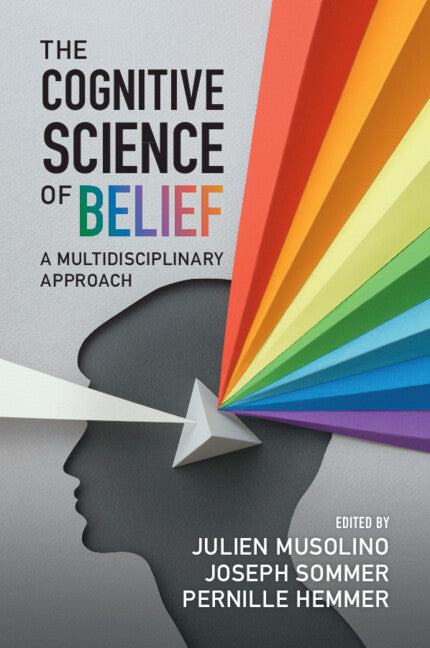Freshly Printed - allow 6 days lead
Couldn't load pickup availability
The Cognitive Science of Belief
A Multidisciplinary Approach
An integrative exploration of the concept of beliefs and their applications as studied across the cognitive sciences.
Julien Musolino (Edited by), Joseph Sommer (Edited by), Pernille Hemmer (Edited by)
9781009009850, Cambridge University Press
Paperback / softback, published 17 November 2022
584 pages
22.8 x 15.2 x 3.2 cm, 0.91 kg
Beliefs play a central role in our lives. They lie at the heart of what makes us human, they shape the organization and functioning of our minds, they define the boundaries of our culture, and they guide our motivation and behavior. Given their central importance, researchers across a number of disciplines have studied beliefs, leading to results and literatures that do not always interact. The Cognitive Science of Belief aims to integrate these disconnected lines of research to start a broader dialogue on the nature, role, and consequences of beliefs. It tackles timeless questions, as well as applications of beliefs that speak to current social issues. This multidisciplinary approach to beliefs will benefit graduate students and researchers in cognitive science, psychology, philosophy, political science, economics, and religious studies.
Introduction Joseph Sommer, Julien Musolino and Pernille Hemmer
Part I. Understanding Belief: 1. The cognitive science of 'belief' (the word) Ray Jackendoff
2. The science of belief: a progress report Nicolas Porot and Eric Mandelbaum
3. The role of context in belief evaluation: costs and benefits of irrational beliefs Elly Vintiadis and Lisa Bortolotti
4. How and why does schematic knowledge affect memory? Qiong Zhang
5. Probability, belief, and the richness of cognition Steve Piantadosi
6. Intuitive and reflective beliefs Dan Sperber
7. Intuitive and reflective beliefs in a modern world Bastien Trémolière and Florence Lespiau
8. Do cultural misbeliefs cause costly behavior? Hugo Mercier and Sacha Altay
9. Cultural evolutionary psychology of belief Theiss Bendixen and Benjamin Grant Purzycki
Part II. Domains of Beliefs: 10. Religious beliefs Pascal Boyer
11. Essentialist views of criminal behavior predict increased punitiveness Justin W. Martin, Sophie Charles, and Larisa Heiphetz
12. Political belief formation: Individual differences and situational factors Lala Muradova and Kevin Arceneaux
13: Americans' lack of political beliefs and the consequences for democracy Yalidy Matos and Katherine McCabe
14. Thoughts and players: an introduction to old and new economic perspectives on beliefs Andras Molnar and George Loewenstein
15. How intuitive beliefs inoculate us against scientific ones Andrew Shtulman
16: COVID-19: conspiracies and collateral damage vs. constructive critique Stephan Lewandowsky, Konstantinos Armaos, Hendrik Bruns, Philipp Schmid, Dawn Liu Holford, Ulrike Hahn, Ahmed Al-Rawi, Sunita Sah, John Cook, Marie Juanchich and James Ladyman
17. Believing in race vs. knowing ourselves Guy Harrison
Part III. Variation in Beliefs: 18. Delusions Philip R. Corlett
19: delusions and beliefs as a symptom of illness Eisuke Sakakibara
20. The elusive search for individual differences in myside thinking Keith E. Stanovich and Maggie E. Toplak
21. Modeling individual differences in beliefs and opinions using thurstonian models Michael Lee and Michelle Y. Ke
22. Belief in human rights: an opportunity for cross-cultural cognitive science Jordan Kiper
23. The belief-action gap in environmental psychology: How wide? How irrational? Aurore Grandin, Mélusine Boon-Falleur and Coralie Chevallier
24. Training can improve decision making Irene Scopelliti
25. Building better beliefs through actively open-minded thinking Emlen Metz.
Subject Areas: Cognition & cognitive psychology [JMR], Social, group or collective psychology [JMH], Cognitivism, cognitive theory [JMAQ]


